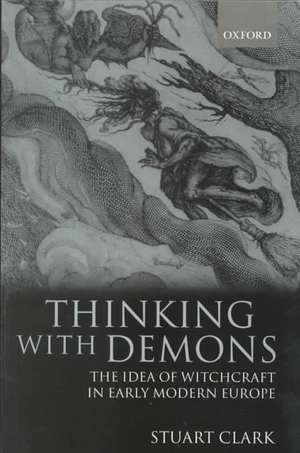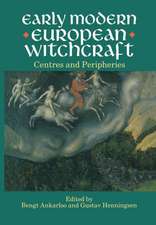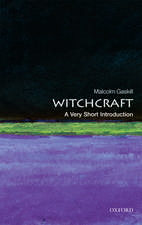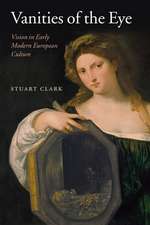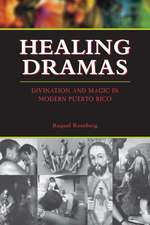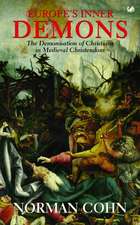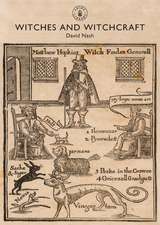Thinking with Demons: The Idea of Witchcraft in Early Modern Europe
Autor Stuart Clarken Limba Engleză Paperback – 21 oct 1999
| Toate formatele și edițiile | Preț | Express |
|---|---|---|
| Paperback (1) | 814.61 lei 32-37 zile | |
| OUP OXFORD – 21 oct 1999 | 814.61 lei 32-37 zile | |
| Hardback (1) | 671.21 lei 32-37 zile | |
| OUP OXFORD – 29 ian 1997 | 671.21 lei 32-37 zile |
Preț: 814.61 lei
Preț vechi: 1136.19 lei
-28% Nou
Puncte Express: 1222
Preț estimativ în valută:
155.88€ • 161.06$ • 129.67£
155.88€ • 161.06$ • 129.67£
Carte tipărită la comandă
Livrare economică 10-15 martie
Preluare comenzi: 021 569.72.76
Specificații
ISBN-13: 9780198208082
ISBN-10: 0198208081
Pagini: 845
Ilustrații: 2 halftones
Dimensiuni: 155 x 234 x 43 mm
Greutate: 1.17 kg
Ediția:Revised
Editura: OUP OXFORD
Colecția OUP Oxford
Locul publicării:Oxford, United Kingdom
ISBN-10: 0198208081
Pagini: 845
Ilustrații: 2 halftones
Dimensiuni: 155 x 234 x 43 mm
Greutate: 1.17 kg
Ediția:Revised
Editura: OUP OXFORD
Colecția OUP Oxford
Locul publicării:Oxford, United Kingdom
Recenzii
This massive and rich book is brimming with suggestions for future researchers. Clark's bibliography is itself a contribution to witchcraft scholarship. Thinking with Demons will become a classic.
This is intellectual history at its best. Clark reads and understands the demonological writings between the late fifteenth and early eighteenth centuries on their own terms
Clarke is showing something of a break with the historiographical trends which have prevailed in witchcraft studies over the last twenty years.
This is a subtle exposition, informed but not distorted by an awareness of linguistic theory. J.A. Sharpe, Renaissance Studies Vol.14, No.3.
a formidable intellectual achievement ... it is doubtful if any current witchcraft scholar could equal the breadth of Clark's acquaintance with both works of demonology and more recent publications. He displays deep erudition with a light touch: the book, for all its length and the profundity of its scholarship, is a pleasure to read.
a rich and exciting exposition of a belief system.
Anybody who still believes that witchcraft was a marginal or unimportant aspect of European history should spend a weekend reading this book. They will emerge from the exercise with a clearer notion of what first rate intellectual history is like.
deeply considered and weighty arguments based on dauntingly wide reading.
this is an ambitious and thematically broad book which constitutes a formidable intellectual achivement.
Thinking with Demons, which offers a lot more than the basics, will intimidate many undergraduates, but will provide them with conclusive proof that witchcraft was not just a matter of village squabbles. It will also remind their teachers of the sheer complexity and pervasiveness of demonological thought.
a tour de force
It is a major accumulation of information about western European writings on witchcraft ... It will be a text consulted and cited by many subsequent scholars on witchcraft.
This is a massive work. It covers far more ground than its title indicates...It is good, in these days of soundbites, "dumbing-down" and widespread intellectual sloth, to come upon such a monument of scholarship. The time, determination and care that must have gone into creating it are most impressive--and so is the result. Th ehopes and fears, doubts and certainties of the early modern intelligentsia come powerfully alive. Anyone who wishes to enter imaginatively into that mental world might well start by reading this remarkable book.
of all the books on the subject that have recently appeared, this is perhaps the most remarkable, raising our understanding of ideas about witchcraft to a new level of sophistication. It is based on massive research in the learned literature of demonology in the period.../ ... Clark's erudition is combined with intense methodological sophistication.../ ... there is no doubt that IThinking with DemonsI willl force us to reconsider the place of witchcraft in early modern ideas, and thus to think more deeply about the nature of those ideas themselves./ Michael Hunter, Birkbeck College, London University, Eighteenth-Century Life, Vol 22, no 1 , May 1998.
This is intellectual history at its best. Clark reads and understands the demonological writings between the late fifteenth and early eighteenth centuries on their own terms
Clarke is showing something of a break with the historiographical trends which have prevailed in witchcraft studies over the last twenty years.
This is a subtle exposition, informed but not distorted by an awareness of linguistic theory. J.A. Sharpe, Renaissance Studies Vol.14, No.3.
a formidable intellectual achievement ... it is doubtful if any current witchcraft scholar could equal the breadth of Clark's acquaintance with both works of demonology and more recent publications. He displays deep erudition with a light touch: the book, for all its length and the profundity of its scholarship, is a pleasure to read.
a rich and exciting exposition of a belief system.
Anybody who still believes that witchcraft was a marginal or unimportant aspect of European history should spend a weekend reading this book. They will emerge from the exercise with a clearer notion of what first rate intellectual history is like.
deeply considered and weighty arguments based on dauntingly wide reading.
this is an ambitious and thematically broad book which constitutes a formidable intellectual achivement.
Thinking with Demons, which offers a lot more than the basics, will intimidate many undergraduates, but will provide them with conclusive proof that witchcraft was not just a matter of village squabbles. It will also remind their teachers of the sheer complexity and pervasiveness of demonological thought.
a tour de force
It is a major accumulation of information about western European writings on witchcraft ... It will be a text consulted and cited by many subsequent scholars on witchcraft.
This is a massive work. It covers far more ground than its title indicates...It is good, in these days of soundbites, "dumbing-down" and widespread intellectual sloth, to come upon such a monument of scholarship. The time, determination and care that must have gone into creating it are most impressive--and so is the result. Th ehopes and fears, doubts and certainties of the early modern intelligentsia come powerfully alive. Anyone who wishes to enter imaginatively into that mental world might well start by reading this remarkable book.
of all the books on the subject that have recently appeared, this is perhaps the most remarkable, raising our understanding of ideas about witchcraft to a new level of sophistication. It is based on massive research in the learned literature of demonology in the period.../ ... Clark's erudition is combined with intense methodological sophistication.../ ... there is no doubt that IThinking with DemonsI willl force us to reconsider the place of witchcraft in early modern ideas, and thus to think more deeply about the nature of those ideas themselves./ Michael Hunter, Birkbeck College, London University, Eighteenth-Century Life, Vol 22, no 1 , May 1998.
